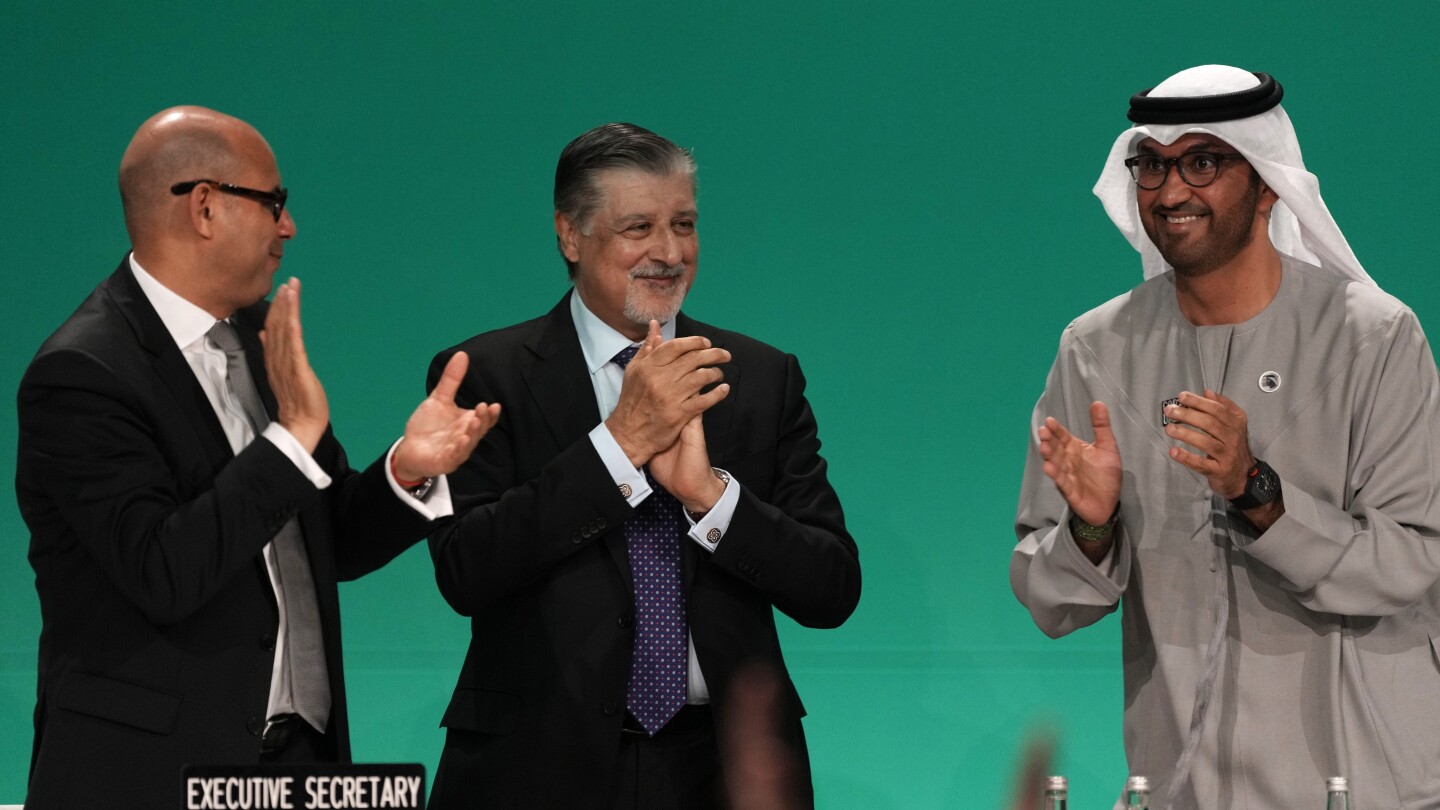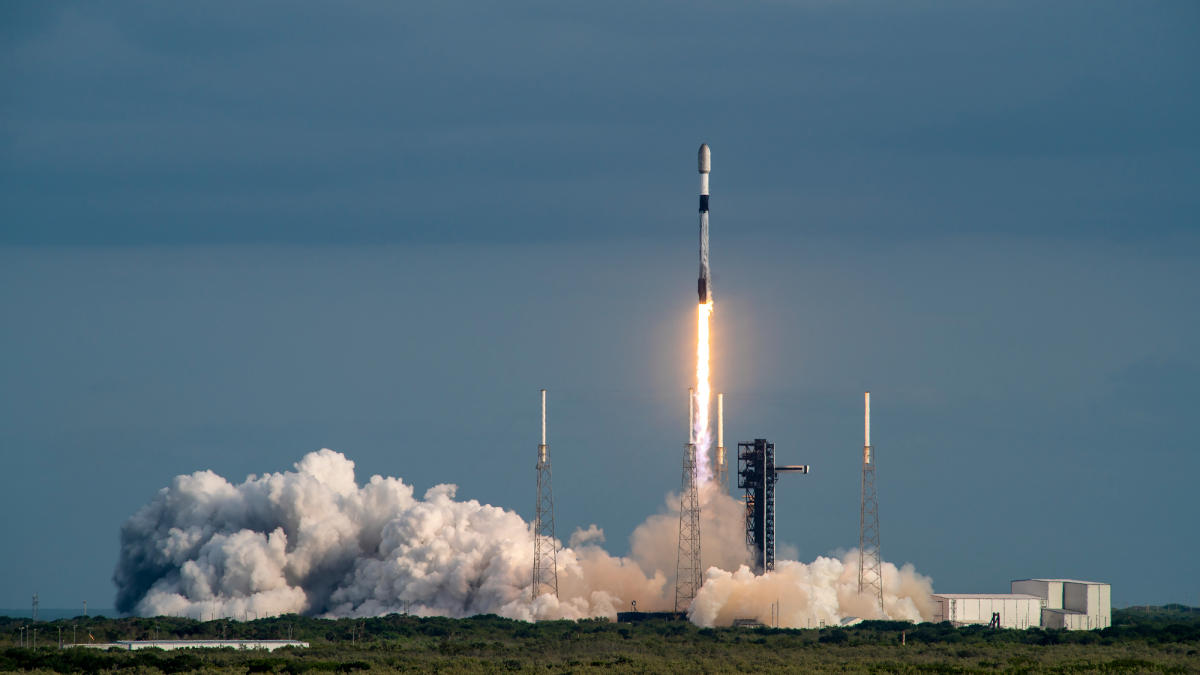DUBAI, United Arab Emirates (AP) — Nearly 200 countries agreed Wednesday to move away from planet-warming fossil fuels — the first time they’ve made that crucial pledge in decades of U.N. climate talks though many warned the deal still had significant shortcomings.
The agreement was approved without the floor fight many feared — and is stronger than a draft floated earlier in the week that angered several nations. But it didn’t call for an outright phasing out of oil, gas and coal — and it gives nations significant wiggle room in their “transition” away from those fuels.
“Humanity has finally done what is long, long, long overdue,” Wopke Hoekstra, European Union commissioner for climate action, said as the COP28 summit wrapped up.
Within minutes of opening Wednesday’s session, COP28 President Sultan al-Jaber gaveled in approval of the central document — an evaluation of how off-track the world is on climate and how to get back on — without giving critics a chance to comment. He hailed it as a “historic package to accelerate climate action.”
The document is the central part of the 2015 Paris accord and its internationally agreed-upon goal to try to limit warming to 1.5 degrees Celsius (2.7 degrees Fahrenheit) above pre-industrial times. The goal is mentioned 13 times in the stocktake document and al-Jaber repeatedly called that his “north star.” So far the world has warmed 1.2 degrees (2.2 degrees Fahrenheit) since the mid 1800s.
Several minutes after al-Jaber rammed the document through, Samoa’s lead delegate Anne Rasmussen, on behalf of small island nations, complained that they weren’t even in the room when al-Jaber said the deal was done. She said that “the course correction that is needed has not been secured,” with the deal representing business-as-usual instead of exponential emissions-cutting efforts. She said the deal could “potentially take us backward rather than forward.”
When Rasmussen finished, delegates whooped, applauded and stood, as al-Jaber frowned and then eventually joined the standing ovation that stretched longer than his plaudits. Marshall Islands delegates hugged and cried.
Germany Foreign Minister Annalena Baerbock stands and claps during a plenary session at the COP28 U.N. Climate Summit, Wednesday, Dec. 13, 2023, in Dubai, United Arab Emirates. (AP Photo/Kamran Jebreili)
Hours later, outside the plenary session, small island nations and European nations along with Colombia, held hands and hugged in an emotional show of support for greater ambition.
But there was more self-congratulations Wednesday than flagellations.
“I am in awe of the spirit of cooperation that has brought everybody together,” United States Special Envoy John Kerry said. He said it shows that multilateralism can still work despite what the globe sees with wars in Ukraine and the Middle East. “This document sends very strong messages to the world.”
United Nations Secretary-General Antonio Guterres said in a statement that “for the first time, the outcome recognizes the need to transition away from fossil fuels.”
“The era of fossil fuels must end – and it must end with justice and equity,” he said.
United Nations Climate Secretary Simon Stiell told delegates their efforts were “needed to signal a hard stop to humanity’s core climate problem: fossil fuels and that planet-burning pollution. Whilst we didn’t turn the page on the fossil fuel era in Dubai, this outcome is the beginning of the end.”
Stiell cautioned people that what they adopted was a “climate action lifeline, not a finish line.”
The new deal had been floated early Wednesday and was stronger than a draft proposed days earlier, but had loopholes that upset critics.
“The problem with the text is that it still includes cavernous loopholes that allow the United States and other fossil fuel producing countries to keep going on their expansion of fossil fuels,” Center for Biological Diversity energy justice director Jean Su told The Associated Press. “There’s a pretty deadly, fatal flaw in the text, which allows for transitional fuels to continue” which is a code word for natural gas that also emits carbon pollution.
The deal also includes a call for tripling the use of renewable energy and doubling energy efficiency. Earlier in the talks, the conference adopted a special fund for poor nations hurt by climate change and nations put nearly $800 million in the fund.
The deal doesn’t go so far as to seek a “phase-out” of fossil fuels, which more than 100 nations, like small island states and European nations, had pleaded for. Instead, it calls for “transitioning away from fossil fuels in energy systems, in a just, orderly and equitable manner, accelerating action in this critical decade.”
German climate envoy Jennifer Morgan said the difference between phase-out and transitioning away could be seen as a positive: “I think the ‘phase-out’ was about sending a clear signal. And I think the ‘just transition away from’ is a way of phrasing the phase-out with the equity component included in it” for poorer nations who can’t act as quickly as richer ones.
Li Shuo of the Asia Society said when the two phrases are translated into Mandarin or Japanese there is essentially no difference.
In a press conference, Kerry called it “a clear unambiguous message on one of the most complicated issues that we face.” He said the United States wanted stronger language, but it was too much “of a steep climb” to get from 195 nations.
He said that “there were times in the last 48 hours were some of us thought this could fail.” But “we stayed at it. People showed good faith. People stepped up.”
The deal says that the transition would be done in a way that gets the world to net zero greenhouse gas emissions in 2050 and carbon pollution to peak by the year 2025, but gives wiggle room to individual nations like China to peak later.
It was the third version presented in about two weeks and the word “oil” does not appear anywhere in the 21-page document, but “fossil fuels” appears twice.
Former U.S. Vice President Al Gore, a Nobel Peace Prize winning climate activist, said while it is an important milestone “to finally recognize that the climate crisis is at its heart a fossil fuel crisis,” he called the deal “the bare minimum” with “half measures and loopholes.’’
“Whether this is a turning point that truly marks the beginning of the end of the fossil fuel era depends on the actions that come next,” Gore said.
___
Associated Press journalists Jon Gambrell, Malak Harb and Bassam Hatoum contributed to this report.
___
Associated Press climate and environmental coverage receives support from several private foundations. See more about AP’s climate initiative here. The AP is solely responsible for all content.

David Turner is a globe-trotting journalist who brings a global perspective to our readers. With a commitment to shedding light on international events, he explores complex geopolitical issues, offering a nuanced view of the world’s most pressing challenges.






